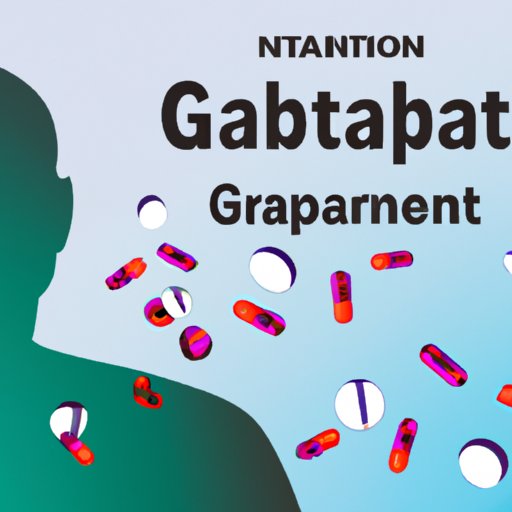Introduction
Gabapentin is a prescription medication primarily used to treat seizures caused by epilepsy. It is also used to relieve certain types of nerve pain, as well as restless legs syndrome and hot flashes. While it is generally safe and effective when taken as prescribed, it can have serious side effects, particularly when taken in large doses or for long periods of time. In this article, we will explore how does gabapentin make you feel, what are the possible positive and negative effects, and how does it interact with other drugs.
Examining the Impact of Gabapentin on Mental and Physical Well-Being
When taken as directed, gabapentin can provide relief from seizures, nerve pain, and other conditions. However, it can also cause changes in mood, emotions, and behavior. Let’s take a closer look at some of the possible effects of gabapentin.
What are the Possible Positive Effects?
For many people, gabapentin can help improve their mental and physical well-being. According to a study published in the journal CNS Drugs, gabapentin has been found to be effective in treating anxiety disorders and depression. In addition, it can help reduce pain, fatigue, and disturbances in sleep. Some people also report feeling calmer and more relaxed after taking gabapentin.
What are the Possible Negative Effects?
As with any medication, there are potential side effects to consider before taking gabapentin. Common side effects of gabapentin include dizziness, drowsiness, confusion, blurred vision, nausea, dry mouth, and constipation. There is also the potential for more serious side effects such as difficulty breathing, swelling of the face, lips, tongue, or throat, and chest pain.
How Does Gabapentin Affect Mood and Emotional State?
Gabapentin can affect your mood and emotional state in different ways. Here are some of the potential effects:
Can it Help with Anxiety?
Some people find that gabapentin helps to reduce feelings of anxiety. Research studies have found that gabapentin can reduce symptoms of generalized anxiety disorder (GAD) and social anxiety disorder (SAD). However, it is important to note that gabapentin should not be used as a substitute for professional treatment for anxiety.
Can it Cause Mood Swings?
In some cases, gabapentin may cause mood swings. This can be due to the fact that gabapentin affects levels of certain neurotransmitters in the brain, which can lead to changes in mood. It is important to talk to your doctor if you experience any sudden or severe mood swings while taking gabapentin.
Can it Change Personality?
There is no evidence that gabapentin can permanently change your personality. However, it can cause temporary changes in mood and behavior that could affect your personality in the short term. If you are concerned about how gabapentin might be affecting your personality, it is best to talk to your doctor.

Exploring the Side Effects of Gabapentin Use
It is important to be aware of both common and rare side effects of gabapentin use. Common side effects include dizziness, drowsiness, confusion, blurred vision, nausea, dry mouth, and constipation. Rare but potentially serious side effects include difficulty breathing, swelling of the face, lips, tongue, or throat, and chest pain. If you experience any of these side effects, it is important to seek medical attention right away.
What Are the Benefits and Risks of Taking Gabapentin?
The benefits of taking gabapentin can outweigh the risks, depending on the individual. For some people, gabapentin can help reduce seizures, nerve pain, and other conditions. It can also help improve mood, reduce anxiety, and improve sleep. However, it is important to be aware of the potential side effects and risks associated with taking gabapentin, such as addiction and overdose.
Investigating the Potential for Gabapentin Abuse
Gabapentin is not considered to be a controlled substance, but it can still be abused. Signs of gabapentin abuse include slurred speech, impaired coordination, drowsiness, and confusion. If you or someone you know is abusing gabapentin, it is important to seek help from a healthcare professional. Treatment options for gabapentin abuse include behavioral therapy, support groups, and medications.

Understanding the Interactions Between Gabapentin and Other Drugs
Gabapentin can interact with other medications, including opioids, benzodiazepines, and alcohol. It is important to tell your doctor about all of the medications you are taking, including any over-the-counter medications, supplements, and vitamins. Your doctor can help you determine the safest and most effective way to take gabapentin.

Evaluating How Long It Takes to Feel the Effects of Gabapentin
The amount of time it takes to feel the effects of gabapentin can vary from person to person. Factors that can affect onset time include age, weight, and the dose of gabapentin. Generally, it takes around one to two hours for gabapentin to start working. However, it can take up to 24 hours for the full effects of the drug to be felt.
Conclusion
Gabapentin is a prescription medication that can be used to treat seizures, nerve pain, and other conditions. When taken as prescribed, it can provide relief from symptoms and improve mental and physical well-being. However, it can also cause side effects, including dizziness, drowsiness, confusion, and mood swings. It is important to be aware of the potential risks and benefits of taking gabapentin, as well as the potential for abuse and drug interactions. Finally, it can take up to 24 hours for the full effects of gabapentin to be felt.
(Note: Is this article not meeting your expectations? Do you have knowledge or insights to share? Unlock new opportunities and expand your reach by joining our authors team. Click Registration to join us and share your expertise with our readers.)
